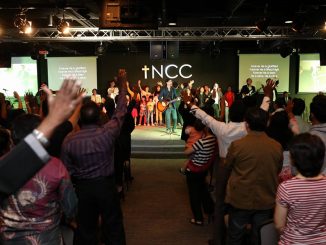
In 1 Corinthians 12:27, it is put across that we are all one, and each of us a part of the Body of Christ. This is a picture of being of one accord, with Christ as the Head controlling the Body’s activities.
John Stott once wrote about this passage. He stated that we all have different functions but each of which is necessary for the maximum health and usefulness of the Body. Moreover, the whole body is animated by a common life. This common life we know as the Holy Spirit, and it is the Holy Spirit’s presence that makes the Body one. Even as a great revival is taking place in our nation, we are reminded once again of the importance of unity and fellowship among our brethren, especially as Christians.

In Matthew 5:13-16, Christ spoke about our roles as salt and light of the Earth. We are made to shine for the Lord, so that the world may know and glorify Him. Inherent in this is our standing as a community, and inherent in that standing is the strength of our bonds of fellowship. We are not created as ‘islands’. As Christians, our presence and our influence on the people around us matters immensely. It is therefore important that we understand what fellowship is, particularly in the Biblical sense.
The word “fellowship” in the Bible is derived from the Greek word “koinonia”, which means “sharing in common”. It implies participation, communion, and sharing. This brings back the picture of the common life that was spoken through the analogy of Christ’s Body.
When we speak about the context of participation, communion, and sharing, what sort of things are we to participate and share in? The world is made up of all sorts of cultural traditions and spiritual beliefs, and obviously it is not possible for us to be in agreement with all of these. This is especially more so as Christ has imparted on us a new identity through Him. So what is meant really by this spirit of participation and communion?

There are many verses in the Bible that provide for us a context of Biblical fellowship. First of all, 1 John 4:11-12 gives us a reminder that since we are beloved by God, we should also love the people around us in the same way. Just as Christ has come down with a heart of love and lives in us today, His love is perfected in us and we are empowered to love others in the same way. In this way, others, even those who have never seen God, will be able to see Him manifested.
Galatians 6:2 imparts that to bear one another’s burdens is to fulfill the commandment of Christ, and the concept of sharing and equity is also found in 2 Corinthians 8:13-15. What ought we to share? The Good News of the Gospel and not just as message, but through actual lived-out testimonies and an actual capacity to give of ourselves. We are to pray and be a blessing to those that we love, that they may come to the love of Christ as is found in the Gospels.

As fellow members of the Body of Christ, we are also called to a wider fellowship amongst our spiritual family. Christians can fellowship together because of the fact that we are all forgiven people. The forgiveness we have experienced from God now affects the way we respond to others who offend us.
Jesus conveyed in Matthew 6:14-15 that if we forgive those who have sinned against us, our heavenly Father will forgive us. If we harbor bitterness and hatred, it will be detrimental to our lives and will eventually consume it.
Why is forgiveness important? A primary reason is for the sake of unity of the Church. As Ecclesiastes 4:9-12 put it beautifully, a cord of 3 strands is not quickly broken and though one may be overpowered, two can defend themselves. We are encouraged to be a daily support to each other, for just as iron sharpens iron, so does one man sharpen another (Proverbs 27:17).

Christian fellowship among spiritual and natural siblings involves multiple responsibilities towards each other. We are to submit to one another out of reverence for Christ (Ephesians 5:21), let the word of Christ dwell richly in us as we teach and caution each other through God-given wisdom (Colossians 3:16), encourage and build one another up (1 Thessalonians 5:11), and meet together regularly so that we may spur one another on toward love and good deeds (Hebrews 10:24-25).
1 Corinthians 12:14-27 offers a complete view of Biblical fellowship. It is God who gave the various parts of the Body their various functions (spiritual gifts, mission and purpose, empowerment, etc) so that there may be no division in the Church, and so that we may care for one another.
As is written in the passage, the foot and the eye cannot say that he has no use of the hand or that it does not belong to the Body. What affects one part of the Body affects the whole. It is the same way with the people in our life, even those we find difficult to relate to. Let us seek God’s love and His wisdom daily in dealing with our relationships, be it spiritual or biological.
NOTE: This reflection owes its inspiration from the chapters of Benny Ho’s book, Personal Basics for the Journey.
|Share The Good News|




Leave a Reply